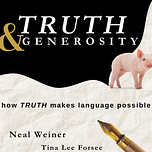Hello everyone,
We’re getting close to the end of the book, just one more BONUS chapter after this.
Stay tuned!
—Neal and Tina
16
Interpreting the World Through Generosity
MIND RULES ALL THINGS, said Anaxagoras. No serious defense of this remark was ever offered by the Greeks, so far as I am aware. That is strange considering the pre-Socratics by and large assumed it, and Plato made it the inspiration for a cosmological teleology which Aristotle then moderated but left mostly intact. For them, it was simply valued in the manner of all things that go without saying. For us, this is perhaps the most startling and embarrassing fact about classical philosophy, for it appears to rest on a more or less bald-faced anthropomorphism; it was from precisely this that the modern world rebelled. And yet, what is mind rules all things but the principle of generosity applied to the world?
Anthropomorphism, it turns out, is the very essence of generosity. A given sentence might not be true, but in order to find that out, we do and must attribute to sentences not only truth itself, but the truth as we understand it. What we must do to understand ordinary language might even be thought worse than anthropomorphism, but it is not a fault. It is, as we have seen, the ground of our common truth. Applying generosity to the world itself might turn out to have some justification.
Listen to this episode with a 7-day free trial
Subscribe to Philosophy and Fiction to listen to this post and get 7 days of free access to the full post archives.








